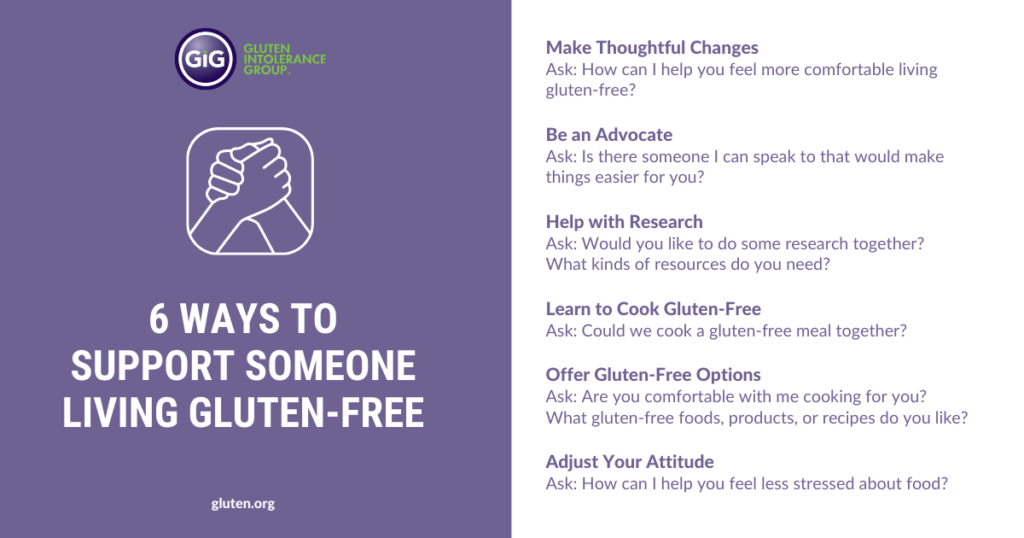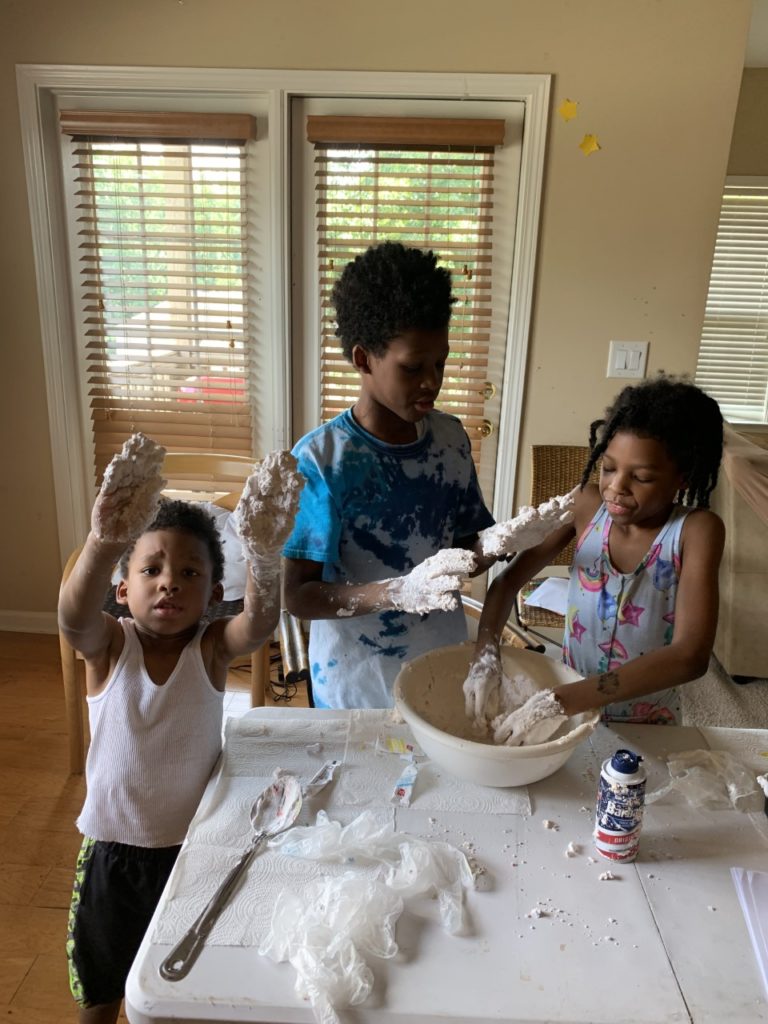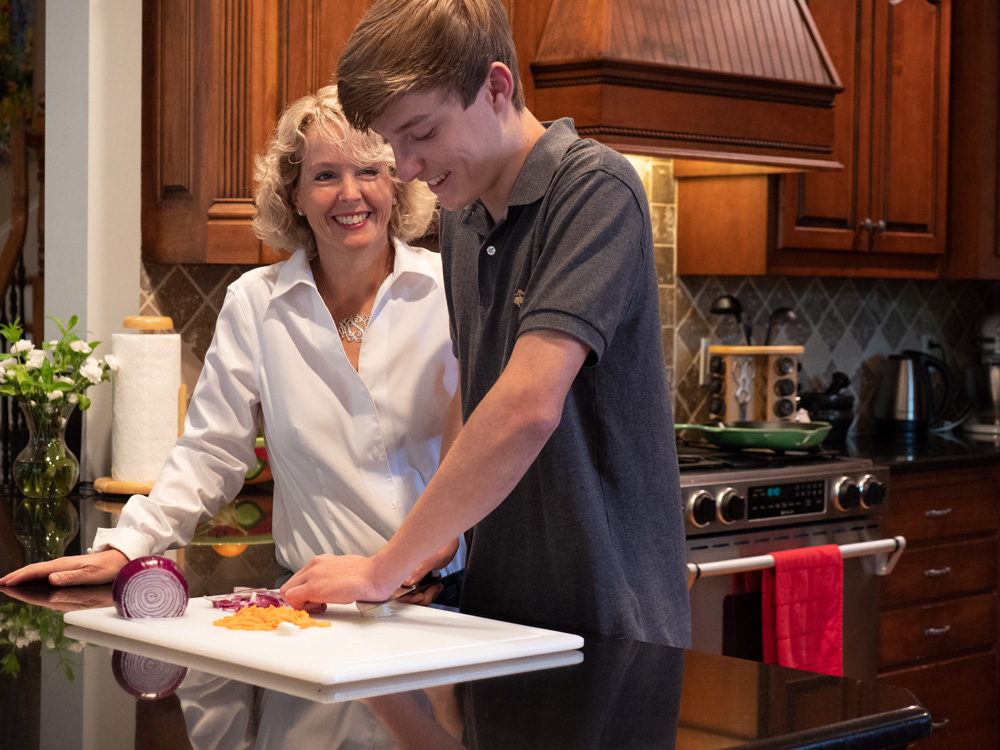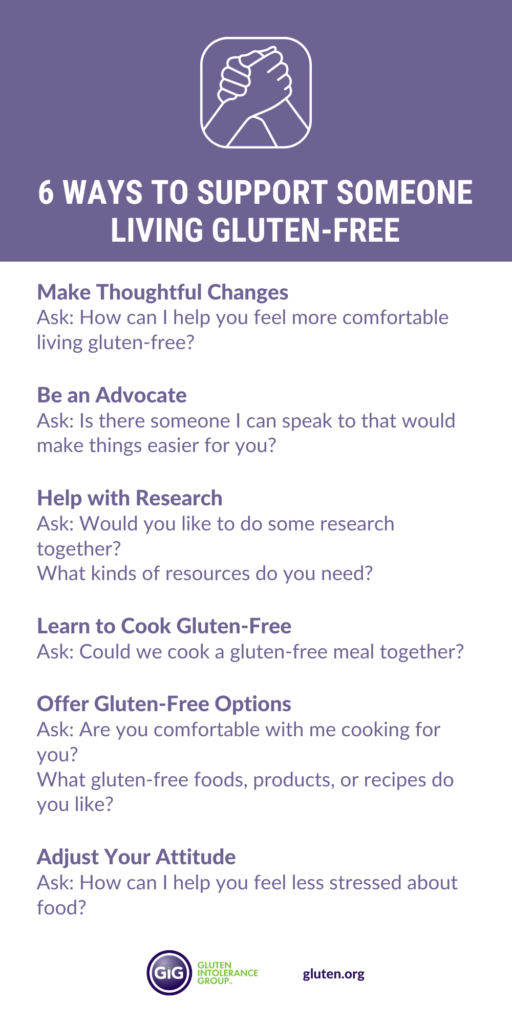Supporting & Encouraging Gluten-Free Loved Ones
Published May, 2021
When Shelly’s youngest son, Christopher, was diagnosed with celiac disease at age 13, she and her husband made the immediate decision to make the entire household gluten-free.
“For our family, this turned out to be an ‘epic fail,’” says Shelly, who resides in Tennessee with her husband and two sons.
Shelly explains that, as parents, she and her husband failed to communicate to their older son about celiac disease or why they were going to stop eating gluten.
“We were constantly correcting him, versus teaching him, on the perils of cross-contact,” Shelly recalls, admitting that she simply stopped buying her oldest son’s favorite foods and went overboard on buying anything with “gluten-free” on the package.
“My older son felt ignored and disliked all my meals, thereby barely eating. And my younger son, with the diagnosis, felt guilty that he had brought these changes to the family.”
Sound familiar? You may know someone with celiac disease or non-celiac gluten sensitivities (NCGS) who is living gluten-free. You want to be supportive, but you’re not sure how. We spoke with two moms who shared their journeys supporting and encouraging their children who are gluten-free.

Make Thoughtful Changes
In Shelly’s case, she decided to take a different approach to supporting her son with celiac disease. With a little more planning, she began to make both gluten-containing and gluten-free meals.
“When we have pasta, I cook two different pots of pasta noodles – one gluten-free and one regular – then make one spaghetti sauce that is gluten-free,” Shelly explains.
She also created separate gluten and gluten-free areas in the family’s pantry and refrigerator, clearly marking foods, like jars of peanut butter and jelly, to specify which were for the gluten eaters to avoid cross-contact.
“I just tried to make both of my children feel important and give them the freedom to eat what they wanted and also respect the other’s condition,” says Shelly. “I also spent more time educating my oldest about celiac disease, answering questions, and discussing how he can better support his brother.”
Adele in Atlanta made a different change, switching her entire family to a gluten-free diet. Her older son has severe allergies and reacts to gluten, so she opted to set up a gluten-free home.
“It makes meal prep easier,” she says. “My son’s younger siblings actually prefer gluten-free, so that is an extra bonus.”
Change can be hard. Talk about the situation with everyone in your household and lay out a plan together to support a loved one with celiac disease. You can get more buy-in if everyone is part of the process of making positive changes to support those in the house who need to be gluten-free. Check out The Tools to Replace in Your Gluten-Free Kitchen and 7 Tips for Avoiding Gluten Cross-Contact at Home for helpful changes you can make.

Be an Advocate
Part of providing encouragement for someone who is living gluten-free is to stand up for, or advocate, for them. Adele says she began advocating for her son as soon as she found out that he had a gluten sensitivity.
“I advocated to family members on what he could and could not eat. I also advocated to his teachers at school,” she recalls.
Adele says school was the most challenging place to get proper support for her son.
“Teachers would host pizza parties and include cookies and cupcakes, all of which contained gluten. I would pack his school lunch, but he eventually stopped eating it, embarrassed since his peers ate school lunch,” she says.
Sometimes, advocating for your child may not have the results you’d expect. Adele said she created a 504 plan for her son so his teachers would take his dietary needs seriously. She met with the school counselor, school nurse, and homeroom teacher. Unfortunately, her son’s teachers would either forget about his dietary needs or simply exclude him from eating at class parties which made him feel worse.
Adele admits she realized that while her son was still attending school, he didn’t eat his packed lunch. She later discovered that he also had an account with the school cafeteria and was ordering cafeteria food. Homeschooling gave her the ability to better monitor what her son was eating for lunch. Adele eventually opted to homeschool her children and feels it was the best decision for her family.
As the mother of a teenager, Shelly says she gently role modeled advocating for her son’s dietary needs when he was a teen.
“Teens do not like to be different or bring unnecessary attention to themselves or be told what to do, but they do need to learn how to self-advocate and have support,” she explains.
When her family went to a restaurant and were choosing items that were gluten-free, she asked follow-up questions such as, “Are the French fries made in a dedicated fryer or shared fryer? We need gluten-free.” She deliberately said “we need” instead of “he needs” so her son did not feel singled out.
Another way she advocated for her son was to speak with parents if her son was attending a birthday party or sleepover at their homes. She would offer to supply gluten-free foods and answer questions they might have about celiac disease and what constitutes gluten-free to put them at ease.
Advocating for someone doesn’t only mean standing up for them, but also means educating others. People usually want to be helpful, but may lack even basic knowledge of what it means to eat entirely gluten-free, much less how to prepare meals that are safe. By educating others, you’re helping build a broader support system for your gluten-free loved one.

Help with Research
Shelly says that after her son’s diagnosis, the research and education curves were quite overwhelming. They received information from a gastroenterologist and handouts and Internet resources from a dietitian. It was too much to take in.
“As a mom, I felt a lot of pressure to research and figure this all out for my son and entire family,” Shelly admits.
At the same time, Shelly’s son was doing research on his own on the disease.
Their combined research efforts led mother and son to write the book, Celiac Lost, to put all of their newfound knowledge in one place in the hopes of helping other families in similar situations.
Anyone diagnosed with celiac disease typically ends up “doing their homework,” researching on the Internet, contacting celiac disease organizations, and gathering everything they can find to learn to live gluten-free. Show your support for someone who is going gluten-free by doing some homework of your own or helping them find the information and resources they need.
Check out GIG’s “Getting Started“ resources to gain a better understanding of celiac disease.
Learn to Cook/Cook Together
Shelly’s son, Christopher, found a creative and productive way to cope with his celiac disease diagnosis: learning to cook. He spent hours researching the best gluten-free ingredients and finding and adapting new recipes to make them gluten-free.
Shelly says one of the most creative ways Christopher and his friends dealt with his celiac disease was to challenge each other to gluten-free cooking contests.
“I think, at some point, his friends may have teased him about his food, so Christopher challenged them. Periodically during their high school years, Christopher would rush home to gather ingredients and off he would go to a friend’s house to have a cook-off,” Shelly says.
She recalls one time Christopher and his friends had a cook-off planned after church. While the family sat in church, fresh salmon was marinating in a cooler in the family car so her son could head straight to his friend’s house immediately after services to compete. Her son won that cooking contest.
Says Shelly, “I think Christopher won over his friends, showing them gluten-free can be just as good — or better — than regular food.”
Inviting someone you know who has celiac disease, or is living gluten-free, to cook a meal with you is a great way to bond and to show your support. Let them choose the meal and pick out the recipes. Offer to buy the gluten-free ingredients. Be aware that your kitchen might not be safely gluten-free, so offer to bring everything to their place, being careful not to include anything with gluten or potentially exposed to gluten, like your own cookware. Check out GIG’s Gluten-Free Meal Plans for inspiration, and have fun in the kitchen while learning about gluten-free food preparation!

Offer Gluten-Free Options
If you’re hosting someone at your home who has informed you that they are gluten-free, the most supportive thing to do is offer gluten-free options. Making gluten-free accommodations also applies to anyone organizing an event, hosting a get-together, or anyone in a position to plan a meal or food that is being made available and served.
When Shelly’s son’s grandmother learned of his celiac disease diagnosis, she was immediately onboard with learning about celiac disease.
Says Shelly, “She did a great job finding gluten-free items and adjusting her own recipes,” adding that Christopher’s friends and their parents have also done a great job of supporting his dietary needs by doing research on their own and making sure he has all the gluten-free foods he needs when he is at their homes.
If you’re not sure what constitutes a safe, gluten-free option, the easiest thing to do is to ask the person with the dietary restrictions or their parent. Chances are they can share a multitude of options, specific brands, and even tips on creating a gluten-free process and area to store and serve foods to avoid cross-contact. Asking questions and making special arrangements is a clear way to show your support.
Adjust Your Attitude
“Communication, adaptability, empathy, and humor are all essential components to supporting someone with celiac disease,” says Shelly.
If you want to be supportive of someone with celiac disease, try to be patient and understanding, particularly with yourself. If you know nothing about celiac disease or NCGS, it can be stressful getting up to speed. Go easy on yourself if you don’t always get it right, but keep at it.
Also, try to be patient when the person who has to avoid gluten asks a lot of questions, either of you or someone else. They need to make sure the food they are being served is safe. The thought of accidentally ingesting gluten can be stressful. Asking questions is the best way to do this. You can be supportive by helping them get the answers they need.
When it comes to dealing with stressful situations, a little humor can’t hurt. Check out 10 Stages of Going Gluten-Free.
Whether you’re a parent, family member, friend, or colleague of someone who is living gluten-free, there are many ways you can support them. Be open to learning, ask questions, find answers, and make appropriate adjustments to show you care.

Disclaimer: The information on this website is for educational purposes only. Consult your healthcare team when considering this information.
© 2021 Gluten Intolerance Group. All Rights Reserved
